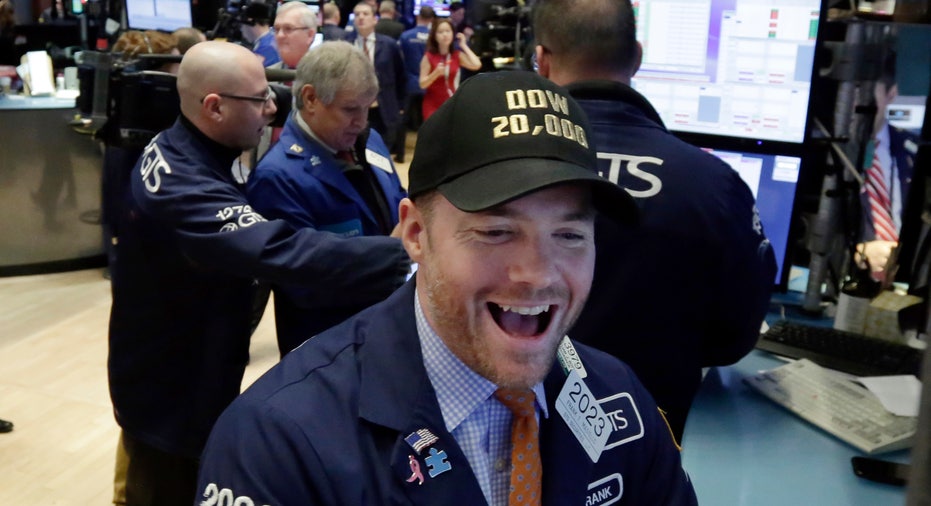Holy Dow 20K and President Trump: What it Means for Your Retirement

The Dow Jones Industrial Average crossed the psychological 20,000 mark on Wednesday for the first time, just days into President Trump’s first week in office. The first 100 days of a new administration have often seen Wall Street gains, but continued market strength depends on what our new president can accomplish in the next few months.
But more importantly, what does it mean for your retirement portfolio?
Good question. With this in mind, the American College of Financial Services released a survey of retirement income professionals, to offer insight on what you should be doing with your money right now.
“Coming out of a highly-contested election season, it is no surprise that many retirees feel a bit wary about their retirement security,” said David Littell, co-director of the retirement-income program at the American College of Financial Services. “At this moment, investors are feeling worried about what they cannot foresee. We found that advisors are keenly aware of their clients’ moods and recognize that there are no ‘one size fits all’ retirement plans in the face of an unpredictable future.”
Littell discussed with FOXBusiness.com the affect potential policy changes might have on retirement planning, and investors’ concerns over retirement security.
Boomer: What are advisors reporting as their clients’ top concerns regarding potential post-election changes?
Littell: Health care topped their concerns (27%), followed by 22% concerned about changes to Social Security. There also was reported overall anxiety about the election results (16%) and another 16% who were concerned about increased market volatility.
Boomer: With the markets touching fresh all-time highs this week, are advisors encouraging their clients to invest more heavily in equities?
Littell: Our survey focused on Retirement Income Certified Professionals—that is financial advisors specializing with working with retirees. Not surprising advisors are telling their retired clients to stay the course (53%). Not many (only 5%) were recommending investing more heavily in the market. What was most interesting from our survey is that advisors are also encouraging their retired clients to lock in gains by rebalancing portfolios back to the intended asset allocation -- or even reducing the allocation to equities. Another strategy that 40% of the advisors indicated they were suggesting was locking in stock market profits and buying more guaranteed lifetime income. As the advisors are pointing out (but consumers don’t often realize) is that a market upturn is a great time for a retiree to add more retirement security by taking gains to buy more lifetime income.
Boomer: Are we headed for more market volatility this year?
Littell: A majority of the advisors, 60%, do expect more market volatility this year. This opinion was not universally held, as 40% answered “no,” they didn’t expect more volatility. Market volatility is an important concern for retirees as ups and downs in a portfolio that a retiree is taking withdrawals from can have an impact on how long retirement assets last.
Boomer: How might President Trump’s potential policy changes impact our retirement plans?
Littell: There’s still a lot of uncertainty of what changes will come, but many expect lower tax rates—which reduce retirement costs and offer opportunities to consider Roth IRA conversions. At the same time, many retirees are concerned that changes to health care and Medicare could increase retirement costs. So far since the election the investment conditions have been favorable for retirees. At least since the election, the market is up partially on expectations of a favorable tax and regulatory environment for business. We may also see higher interest rates on bonds, or other fixed income investments. Although, this has the short-run impact of lowering the value of currently owned lower-rate bonds.
Boomer: What can Baby Boomers do to brace for the unexpected?
Littell: A balanced retirement plan is the best way to be prepared for retirement uncertainty. Balance means having a combination of life-time income sources (Social Security, company pensions, income annuities) and a well-diversified investment portfolio that has a significant exposure to equities. Balance also means having different types of accounts for tax diversification, including: tax-deferred (traditional IRA), tax-exempt (Roth IRA) and taxable investments. Preparing for uncertainty also means staying aware of changes and reacting to them appropriately. This is one of the most important reasons to work with a financial advisor, who can help an individual react to change.



















